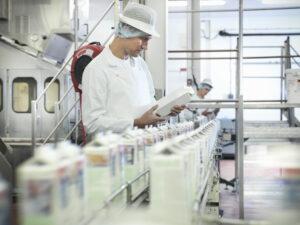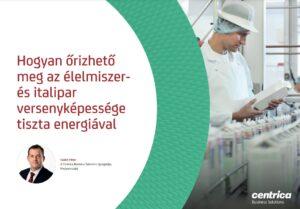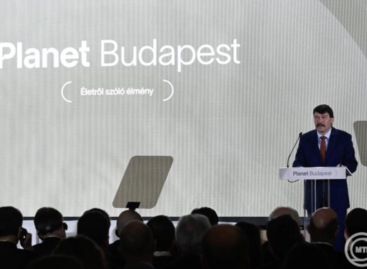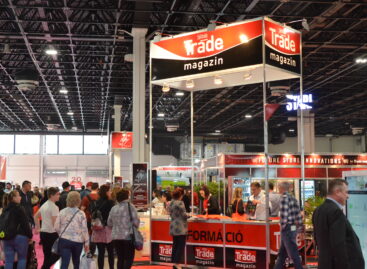Making profits instead of paying high energy bills?
Achieving zero carbon emissions doesn’t have to mean choosing between profit and the planet. The energy consumption, carbon footprint and costs of food and drink manufacturers can be reduced.

(Photo: Getty Images)
A green food industry isn’t just an expectation, it should be an objective for all
All over the world, because of cost-efficiency reasons it isn’t only an expectation, but also an imperative for food companies to optimise their energy consumption and achieve zero carbon emissions. Within the food systems food processing, distribution, and the related consumption account for 30% of global energy use. In the food sector it is more difficult to optimise carbon emissions than in other processing industries, because of the operation of different refrigeration and heating systems. Energy prices have increased dramatically in Europe and at global level, and consumers are demanding emission reductions, while governments are setting strict climate targets for companies in the sector. Manufacturers are looking at ways of meeting both short- and long-term targets, at the same time also bringing down their energy use and carbon emissions. A survey by leading multinational energy and services company Centrica Business Solutions has found: 64% of food and drink companies already have some kind of energy efficiency scheme in place, and 18% are using IOT solutions. The latter are digital systems for monitoring energy use, and environmentally harmful and energy-intensive operations.
State-of-the-art renewable technologies
Deployed renewable energy solutions are taking the operations of food and drink companies to a new level, not only cutting their energy costs significantly, but also assisting them in achieving their zero carbon emissions targets. In its latest food industry study, Centrica Business Solutions has introduced a few successful projects. For instance Innocent Drinks has used state-of-the-art technology such as heat pumps, on-site wind turbines, and solar panels to achieve total carbon neutrality at its newest production plant in Rotterdam. Agricultural suppliers can also use solar energy to lower their energy costs and emissions in crop production. Some Dutch greenhouse farmers collect the rainwater they need to irrigate their crops in reservoirs, and Centrica Business Solutions and Albers Alligator have teamed up to develop a new floating panel system for the roofs covering the reservoirs. Besides serving as a reservoir cover, this innovation is also a sustainable, reliable, and cost-effective source of electricity. In Italy a ham production facility in Gualerzi – in the province of Parma – they are using a 425 kW solar panel system to generate about 60% of the factory’s electricity needs; this is a big step forward in reducing carbon dioxide emissions, not to mention the fact that the method is cost-effective too.
There is no green future without hydrogen
Using hydrogen CHP can also be an effective way of cutting costs and carbon emissions. Relying on this technology, leading multinational aseptic food packaging company IFFCO has reduced its energy costs by 30% at its facility located in the province of Caserta. When designing one of Europe’s largest plants, a British bakery also opted for CHP technology for the most efficient operation. Owing to the high heat demand of the production process, the bakery has partnered with Centrica Business Solutions to install one of the newest and most efficient 1 MWe combined heat and power (CHP) units on its site. The unit produces low-voltage electricity, which the system converts to high-voltage electricity and transmits it to the facility’s 11 KV circuit. Thanks to the CHP unit, the plant’s annual carbon dioxide emissions will drop 1,000 tonnes. What is more, energy costs will be reduced by around GBP 400,000 per year, allowing the company to pay for the warranty-backed unit in around three years.
Together for a more sustainable food industry
Péter Szabó, managing director of Centrica Business Solutions told: “Achieving net zero carbon emissions doesn’t have to mean choosing between profit and the planet. Solar panels, cogeneration units, heat pumps, and heat probes are all equipment that food and drink companies can use to curb their emissions and ensure their long-term competitiveness. By doing so, they contribute to making the food system more sustainable in the future”. Centrica Business Solutions builds, operates and maintains energy devices that help companies decarbonise and save money. The company specialises in on-site, behind-the-meter energy solutions for medium- and large-sized industrial companies, mainly in the manufacturing, food, pharmaceutical and healthcare sectors. With more than 200 years of experience in the energy market, Centrica Business Solutions has great industry expertise, enabling them to meet a full range of thermal and energy needs with their solutions. They integrate on-site solar PV, combined heat and power fuelled with natural gas and hydrogen-ready heat pumps and other energy efficiency solutions. All of this is combined with financing options and leading operation and maintenance skills. Their solutions help companies achieve a balance between the needs of the planet and the needs of making a profit.

This article was written with the sponsorship of Centrica.









